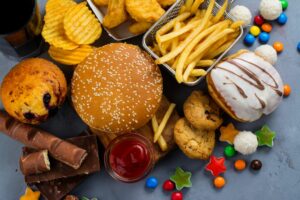Struggling with your healthy eating intentions? Our attitude to food has become oh so complicated, but why? Dr Meg Arroll explains
The psychology of food and eating behaviour is indeed complicated. Eating is a behaviour and like all human behaviours it is far from simple.
It may seem sensible that we feel hungry, so we eat, but there are many other factors that are involved in the food that we choose to consume, including:
- health
- mood
- convenience
- sensory appeal
- natural content
- price
- weight control
- familiarity
- ethical concern
#1 Round the clock food availability – a modern dilemma
The sheer availability of food and drink makes it harder to eat within our needs because we are evolutionarily wired to seek out energy-dense sources of nutrition.
We live in a 24-hour society – not only are shops open late, but there are also apps that deliver take-aways at a touch of a button, throughout both day and night.
A study in mice gives us some clues as to why our modern lifestyles make eating so complicated.
In a lab, mice that ate whenever they liked (day and night) gained more weight than those that could only eat during an 8-hour window, showing that it was not the type of food that made one group gain a significant amount more weight (28% in fact) but the disruption in normal eating patterns.
physiologically our default is to fear lack of food
Fasting diets are very popular now, but the sheer availability of food is unlike anything we’ve ever experienced in human history.
Although we live in a technologically evolved world, physiologically our default is to fear lack of food (famine) so the urge to feast is always with us.
Foods are engineered to tap into this primitive drive, specifically designed to reach a ‘bliss point’ that triggers the reward centres in the human brain.
These foods are highly processed to be cost-efficient for the manufacturer, but usually, they are nutrient-poor.
#2 Marketing vs brainwashing
Many millions of pounds are spent every year to trigger our associations between foods and our feelings, so that we reach for them zombie-like on a regular basis.
It’s not difficult to think of ads in which food is coupled with attractiveness, aspiration and even sex. These images then elicit feelings of indulgence, naughtiness and sensuality.
images then elicit feelings of indulgence
Social anthropologists theorise that food is associated with sex as they are both biological necessities for survival. This is yet another factor that complicates our relationship with food, which has resulted in even more confusion regarding what is, and what isn’t, a healthy diet.
So, if we layer this on top of our already complex picture our societal norms and expectations around body image, is it any surprise that eating has become so complicated?
#3 Easy to eat junk food
Given the considerations mentioned above, it’s not surprising that we can be tempted by foods that expand our waistlines.
If we take ‘junk food’ as an example, such as high processed items like biscuits and crisps are relatively cheap and a great deal more convenient than rustling up homemade meals from organic, farm-fresh produce.
high processed items like biscuits and crisps are relatively cheap
These often have bright packaging that jumps out from the aisles and is targeted at specific groups in terms of the look and text on wrappers.
These foods may be more familiar to you also if this is what you grew up with.
#4 Food as a reward
Furthermore, mood and food have a close relationship, so if a biscuit or sweet was offered after a scraped knee as a child, there is an association between these foods and comfort.
For some people, whether food is natural and ethical can play a part in choice also. Hence, what at first seems like a very simple everyday activity in terms of food choice, is actually much more complex than at first glance.
sustenance is linked with comfort and safety
The consumption, preparation and sharing of food are all delicately intertwined with our emotions, relationships and culture – and these are some of the reasons why eating habits can be so hard to break.
From the moment we are born, sustenance is linked with comfort and safety – so it’s little wonder that we turn to food when we’re feeling down, stressed or insecure.
Children tend to eat what their parents eat, hence if parents’ snacks and treats are crisps, chocolate and pastries then these are the types of foods kids will also choose.
#5 Childhood lays the foundations
But why is it that as full-grown adults we still fall back on the foodstuff of our childhood?
We may think that as tax-paying grown-ups we should be able to have more control on our food choices, but studies show that how we eat as children trickle through adolescence, then adulthood, and become our personal eating habits.
we often eat on autopilot and follow child and adolescent food habits
This, in part, could be due to exposure – it’s hard to develop a taste for foods you’ve never had the opportunity to try.
Indeed, there is a direct relationship between the number of times children are presented with foodstuffs and their liking for it – the greater the exposure, the greater the preference for a certain food.
This is why eating behaviours from childhood persist – we often eat on autopilot and follow child and adolescent food habits with little conscious awareness.
Dr Meg Arroll is a Chartered Psychology and works with wellbeing and supplement brand Healthspan.
Dr Meg has a special interest in health and behaviour change and has written a number of health books and sees private clients at www.drmegarroll.com
More Healthista Content:
5 surprising things you can treat with Botox
Best diet for menopause – an interview with Dr Clare Bailey
Workplace overwhelm? Psychologist reveals how to find the perfect work/life balance
Children’s mental health – child psychotherapist reveals key signs to look out for
Contact lenses: expert reveals 5 key rules
Like this article? Sign up to our newsletter to get more articles like this delivered straight to your inbox.


























































